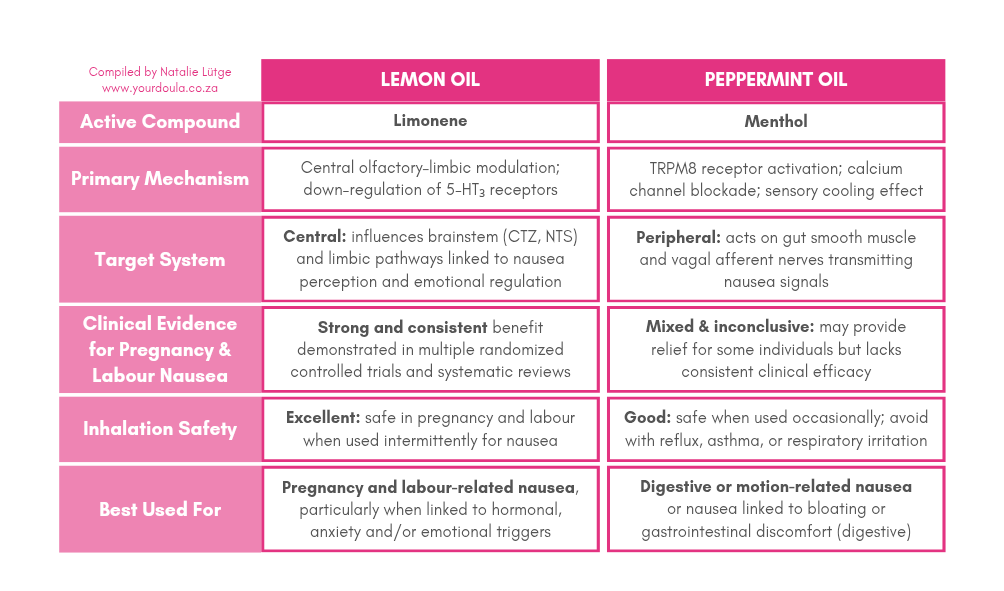If you’ve ever battled that queasy, unsettled feeling during pregnancy, you’re not alone. Nausea (and its less glamorous sidekick, vomiting) are among the most common discomforts experienced by pregnant women – especially in the first trimester, but sometimes even resurfacing in late pregnancy or during labour itself.
Nausea during labour can be both unsettling and exhausting. For many birthing women, the intensity of contractions, hormonal fluctuations, and heightened sensitivity to smells can make nausea and vomiting an unwelcome companion in the birth room. It’s one of those discomforts that can sap energy and focus – right when a woman needs both most.
Over the years, aromatherapy has become a gentle, non-invasive form of support, often recommended by midwives and doulas to ease discomforts in labour. Two essential oils are most frequently suggested for nausea: peppermint (Mentha × piperita) and lemon (Citrus limon).
Now, I know most of us like to get straight to the good part, so let’s not bury the lead: Lemon essential oil stands out as the most evidence-backed and physiologically sound choice for easing nausea in pregnancy and labour.
However, if you’d like to find out why – and how it actually works inside the body – then grab a cup of tea (or a slice of lemon, perhaps), settle in, and keep reading.
 Understanding The Science of Scent and Nausea in Pregnancy and Labour
Understanding The Science of Scent and Nausea in Pregnancy and Labour
Nausea is not just “in the stomach.” It’s a complex, multi-system experience influenced by hormonal, neurological, and gastrointestinal factors.
During pregnancy and labour, elevated levels of human chorionic gonadotropin (hCG) and estrogen, together with changes in gastric motility and increased sensitivity within the brain’s vomiting centre – specifically the area postrema and nucleus tractus solitarius in the medulla oblongata – all play a part. Add in a touch of labour-day reality like anxiety, dehydration, exhaustion, and pain, and the body’s nausea signals can quickly become amplified. In other words: it’s not all in your head… but your head definitely gets involved.
The brain’s vomiting centre receives messages from several sources – the chemoreceptor trigger zone (CTZ), the vestibular system (which manages balance and motion), and the gastrointestinal tract itself. When the stomach is irritated or certain chemicals circulate in the blood, neurotransmitters such as serotonin (5-HT₃), dopamine, and acetylcholine send signals to this area, resulting in that dreaded wave of nausea [1].
This is where aromatherapy steps in. Essential oils work primarily through olfactory stimulation – our sense of smell. When inhaled, their volatile molecules travel through the nasal cavity and bind to olfactory receptors that have a direct neural connection to the limbic system, the brain’s emotional and autonomic control hub [2].
And here’s where it gets fascinating: this link between smell and emotion allows certain essential oils to modulate nerve activity and neurotransmitter balance, indirectly influencing the same pathways that regulate nausea and vomiting [3]. In simpler terms, what you smell can literally help calm what your stomach feels.
 Peppermint Essential Oil (Mentha × piperita)
Peppermint Essential Oil (Mentha × piperita)
Main Active Compounds
Menthol (30–55%)
Menthone (15–30%)
1,8-Cineole, Menthyl acetate, Isomenthone
How Peppermint Oil Works
Peppermint oil owes most of its effects to menthol, which acts on TRPM8 ion channels – the same cold-sensitive receptors responsible for that instantly recognizable cooling sensation you feel when menthol touches your skin or mucous membranes [4].
This cooling effect isn’t just sensory — it’s also physiological:
- Reduces vagal nerve firing: Menthol decreases the activity of the vagal afferent nerves, which send nausea signals from the gut to the brainstem.
- Relaxes gastrointestinal smooth muscle: By blocking calcium channels, it helps relieve cramping and bloating, which can intensify nausea [5].
- Modulates GABAergic activity: Menthol may influence GABA receptors in the brain, producing a mild calming effect on the central nervous system [6].
Together, these mechanisms explain why peppermint oil often provides relief from nausea associated with digestive discomfort, motion sickness, or post-operative nausea. However – and this is where things get interesting – when it comes to pregnancy or labour-related nausea, the scientific evidence is far less convincing.
Clinical Evidence
Randomised controlled trials (RCTs) on peppermint oil’s effectiveness for nausea in pregnancy have produced mixed results.
For instance, Goel et al. (2013) found that peppermint aromatherapy did not significantly reduce nausea scores compared to placebo in pregnant women [7]. Other studies have noted mild improvement, but most show no statistically meaningful difference from control groups.
This inconsistency suggests that peppermint may help some women primarily through sensory distraction or personal scent preference, rather than through a direct chemicophysiological anti-nausea mechanism.
Safety and Considerations
Peppermint oil is generally safe when used intermittently for inhalation in very small, diluted amounts (for example, 1–2 drops on a cotton pad held near the face for short periods).
However, a few important points deserve attention:
- Respiratory irritation: In sensitive individuals, menthol vapour can sometimes trigger coughing or bronchospasm.
- Gastroesophageal reflux: Menthol may relax the lower oesophageal sphincter, occasionally worsening heartburn.
- Breastmilk suppression: High or prolonged exposure, especially orally or topically near the breasts, may reduce milk supply in some lactating women, possibly by lowering prolactin secretion [8].
Everyone’s body responds differently postpartum, but this remains a reasonable caution – especially when safer, evidence-stronger alternatives exist.
So, think of peppermint oil as the “quick-fix friend” – great in small doses, but not someone you’d want to move in with.
 Lemon Oil (Citrus limon)
Lemon Oil (Citrus limon)
Main Active Compounds
Limonene (60-75%)
β-Pinene, γ-Terpinene
Minor aldehydes such as citral, neral, and geranial
How Lemon Oil Works
Lemon oil’s anti-nausea activity is primarily attributed to limonene, a cyclic monoterpene that acts on both olfactory-neural pathways and central neurotransmitter systems involved in nausea regulation.
- Olfactory Activation: When inhaled, limonene molecules bind to olfactory receptors within the nasal epithelium. These receptors send signals via the olfactory bulb to the limbic system – notably the amygdala, hippocampus, and hypothalamus – regions that influence emotion, memory, and autonomic function. This neural activation produces an uplifting, calming sensory response that can modulate the emotional and physiological components of nausea [9].
- Central Anti-Emetic Signaling: Limonene also acts on central pathways within the chemoreceptor trigger zone (CTZ) and nucleus tractus solitarius (NTS) of the brainstem – areas responsible for initiating the vomiting reflex. Experimental data suggest that limonene down-regulates serotonin (5-HT₃) receptor activity and modulates dopamine transmission within these nuclei [10]. This is noteworthy because 5-HT₃ receptors are the same targets for pharmaceutical antiemetics such as ondansetron [11].
- Autonomic and Emotional Regulation: Lemon oil promotes a parasympathetic (rest-and-digest) state, while dampening sympathetic stress responses. EEG and fMRI studies demonstrate that inhalation of citrus scents, particularly limonene-rich vapours, reduces markers of anxiety and stress-related neural activity [12].
- Gastrointestinal Stability: In animal models, limonene has been observed to stabilize gastric motility and reduce gastric dysrhythmia – abnormal contractions of the stomach that commonly underlie nausea [13].
Clinical Evidence
- Lemon oil currently has the strongest clinical backing among essential oils for nausea and vomiting in pregnancy.
- Lua & Zakaria (2012) conducted a randomized controlled trial on pregnant women and found that inhalation of lemon essential oil significantly reduced the frequency and intensity of nausea and vomiting compared to placebo [14].
- Systematic reviews on aromatherapy for pregnancy-related nausea have since highlighted lemon oil as one of the most consistently effective essential oils studied [15].
Although most trials focus on early pregnancy, the same olfactory-neurochemical mechanisms apply in labour-related nausea, making lemon oil a safer, and more effective evidence-aligned choice in both contexts.
Safety and Considerations
Safe for intermittent inhalation (1-2 drops on a cotton ball, tissue, or diffuser).
Avoid direct skin application of undiluted oil, as cold-pressed citrus oils can cause phototoxic reactions if exposed to sunlight.
Discontinue use if any form of discomfort occurs.
If you’re anything like me, and find that you learn much easier through a comparison table format, well then here’s a comparison table of both Lemon and Peppermint oil to help you better understand the pharmacological differences between them:

My final thoughts – therefore – are this….
When we look purely at the science, lemon essential oil offers the most reliable, evidence-backed, and physiologically sound approach for managing nausea during pregnancy and labour.
Its mechanism of action directly targets the same neural circuits affected by pharmaceutical antiemetics, yet it does so gently, safely, and naturally.
Peppermint oil, while refreshing and useful for digestive discomfort, shows mixed results for pregnancy-related nausea and carries the added consideration of potential greater risks than lemon oil. It may be a great ‘pick-me-up’ option to refresh someone AFTER a vomiting episode, but as a nausea suppressant relating to hormonal, psychological and/or emotional triggers, it’s not an ideal option – when considering the phytochemical and pharmacological actions – compared to lemon oil. Peppermint is best kept as the “kitchen nausea” remedy instead.
And ultimately, the best oil is the one that brings comfort without compromise – both physiologically and emotionally. For most women, lemon oil stands out as the safer, more consistent, and more universally beneficial choice in maternity care. Because beyond the chemistry and the clinical data, there’s something profoundly human about scent: a familiar fragrance that can shift a woman from anxiety to calm, and from nausea to relief, in just a few slow breaths.
So while lemon oil might take the scientific lead, let’s not forget the power of presence, intention, and connection. Sometimes, all it takes is a few drops, a deep breath, and a quiet moment of calm to remind a woman that her body already knows exactly what to do.
♥ ♥ ♥
1. Miner, W. D., & Sanger, G. J. (1986). Inhibition of cisplatin-induced vomiting by selective 5-hydroxytryptamine M-receptor antagonism. British Journal of Pharmacology, 88(3), 497–499.
2. Herz, R. S. (2009). Aromatherapy facts and fictions: A scientific analysis of olfactory effects on mood, physiology and behavior. International Journal of Neuroscience, 119(2), 263–290.
3. Tisserand, R., & Young, R. (2014). Essential Oil Safety: A Guide for Health Care Professionals (2nd ed.). Churchill Livingstone.
4. Nakamura, A., et al. (2018). TRPM8 activation by menthol suppresses vomiting reflex in animal models. Neurogastroenterology and Motility, 30(2), e13102.
5. Amaral, J. F., et al. (2014). Menthol blocks calcium channels and relaxes gastrointestinal smooth muscle. European Journal of Pharmacology, 734, 145–153.
6. Souto-Maior, F. N., et al. (2011). Anxiolytic-like effects of limonene in mice. Pharmacology Biochemistry and Behavior, 100(1), 82–88.
7. Goel, S., et al. (2013). Effect of peppermint aromatherapy on nausea and vomiting in pregnancy: A randomized controlled trial. Iranian Red Crescent Medical Journal, 15(5), 394–399.
8. Lawrence, R. A., & Lawrence, R. M. (2016). Breastfeeding: A Guide for the Medical Profession (8th ed.). Elsevier.
9. Komiya, M., Takeuchi, T., & Harada, E. (2006). Lemon oil vapor causes an anti-stress effect via modulating the 5-HT and DA activities in mice. Behavioural Brain Research, 172(2), 240–249.
10. Kwon, Y. J., et al. (2019). Limonene inhibits serotonin (5-HT₃A) receptor-mediated ion currents: possible mechanism underlying its antiemetic effect. Phytotherapy Research, 33(6), 1580–1587.
11. Sun, J. (2007). D-Limonene: safety and clinical applications. Alternative Medicine Review, 12(3), 259–264.
12. Kim, S. H., et al. (2016). Olfactory stimulation by citrus fragrance attenuates stress-induced alterations in the hypothalamic-pituitary-adrenal axis. Neuroscience Letters, 624, 12–18.
13. Tate, S., & Price, A. (2017). Aromatherapy for Health Professionals (5th ed.). Elsevier.
14. Lua, P. L., & Zakaria, N. S. (2012). A randomized controlled trial of aromatherapy in reducing nausea and vomiting during pregnancy. Complementary Therapies in Clinical Practice, 18(3), 154–160.
15. Smith, C. A., Crowther, C. A., & Beilby, J. (2014). Aromatherapy for nausea and vomiting in early pregnancy. Cochrane Database of Systematic Reviews, CD007509.

